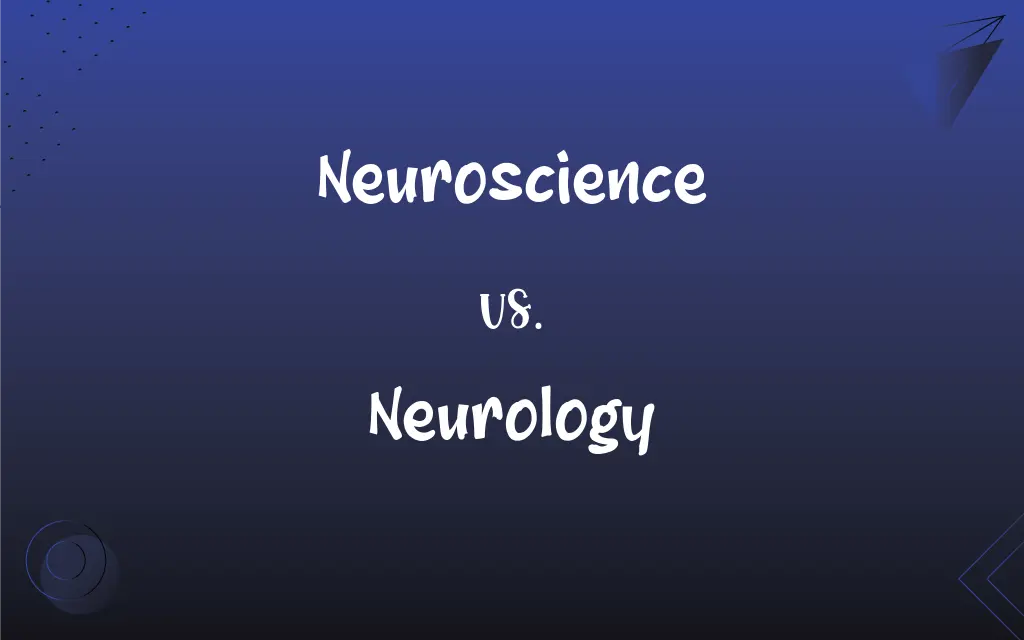Neuroscience vs. Neurology: What's the Difference?
Edited by Aimie Carlson || By Janet White || Published on January 10, 2024
Neuroscience is the scientific study of the nervous system, while neurology is a branch of medicine dealing with disorders of the nervous system.

Key Differences
Neuroscience encompasses the comprehensive study of the nervous system, including its structure, function, development, genetics, biochemistry, physiology, pharmacology, and pathology. Neurology, on the other hand, is a medical field focused specifically on diagnosing, treating, and managing disorders and diseases of the nervous system.
Researchers in neuroscience may work in various subfields, such as cognitive neuroscience, molecular neuroscience, or computational neuroscience, contributing to a broader understanding of the nervous system. Neurologists, however, are medical doctors who apply this knowledge to diagnose and treat neurological conditions like Alzheimer's, Parkinson's, epilepsy, and stroke.
The scope of neuroscience includes both basic research, aimed at understanding the nervous system's workings, and applied research, which may have clinical applications. In contrast, neurology is inherently clinical, directly concerned with patient care and treatment strategies.
Neuroscience can involve multidisciplinary approaches, combining biology, chemistry, physics, and computer science to explore the nervous system. Neurology, while informed by neuroscience findings, primarily revolves around clinical methods, patient examination, and medical interventions.
The advancements in neuroscience often lead to new insights into brain function and the development of potential treatments. Neurology takes these advancements and translates them into practical approaches to prevent, diagnose, and treat neurological disorders.
ADVERTISEMENT
Comparison Chart
Focus
Study of the nervous system in its entirety
Diagnosis and treatment of nervous system disorders
Scope
Broad, includes basic and applied research
Primarily clinical, focused on patient care
Subfields
Includes cognitive, molecular, computational neuroscience, etc.
Includes pediatric neurology, neuro-oncology, etc.
Professionals
Researchers, scientists, academics
Medical doctors (neurologists)
Application
Research-driven, contributes to overall understanding
Directly involved in patient treatment and management
ADVERTISEMENT
Neuroscience and Neurology Definitions
Neuroscience
A multidisciplinary field encompassing biology, psychology, and chemistry to study the brain.
Neuroscience is integral in developing new treatments for mental health disorders.
Neurology
The medical practice focused on treating diseases of the brain, spinal cord, nerves, and muscles.
Neurology has advanced significantly in treating multiple sclerosis.
Neuroscience
The study of how the nervous system impacts behavior and cognitive functions.
Neuroscience has revealed much about the brain's role in decision-making.
Neurology
The study and treatment of nervous system dysfunctions and their symptoms.
Neurology is evolving rapidly with the development of new diagnostic technologies.
Neuroscience
The scientific study of the nervous system and its functions.
Her research in neuroscience led to breakthroughs in understanding memory formation.
Neurology
A clinical field involving the diagnosis and treatment of neurological conditions.
Her expertise in neurology was crucial in managing the patient's epilepsy.
Neuroscience
The exploration of how the nervous system develops, its structure, and how it operates.
The neuroscience seminar focused on the latest findings in neural plasticity.
Neurology
A branch of medicine dealing with disorders of the nervous system.
He consulted a neurologist to diagnose his recurring migraines.
Neuroscience
A field investigating the molecular and cellular mechanisms of neural functions.
Advances in neuroscience have enhanced our understanding of neurotransmission.
Neurology
A medical specialty addressing both central and peripheral nervous system ailments.
The neurology department is equipped to handle various stroke cases.
Neuroscience
Any of the sciences, such as neuroanatomy and neurobiology, that deal with the nervous system.
Neurology
The branch of medicine that deals with the diagnosis and treatment of diseases and disorders of the nervous system.
Neuroscience
The scientific study of the nervous system.
Neurology
The branch of medicine that deals with the disorders of nervous system including the brain and spinal cord of the central nervous system and the nerves, muscles, and neuromuscular junction of the peripheral nervous system.
Neuroscience
The scientific study of the nervous system
Neurology
Focal neurologic signs; focal neurologic deficits.
Patient had no neurology.
Neurology
The results of a neurological examination.
Neurology is normal.
Neurology
The branch of science which treats of the nervous system.
Neurology
The branch of medical science that deals with the nervous system and its disorders
Neurology
(neurology) the branch of medicine that deals with the nervous system and its disorders
FAQs
What do neuroscientists do?
Neuroscientists conduct research to understand how the nervous system works and to develop treatments for neurological disorders.
Is neuroscience interdisciplinary?
Yes, neuroscience is an interdisciplinary field, combining insights from biology, chemistry, psychology, and other sciences.
What is neuroscience?
Neuroscience is the scientific study of the nervous system, including its structure, function, and disorders.
What is neurology?
Neurology is a branch of medicine focusing on diagnosing and treating disorders of the nervous system.
Are there different branches of neuroscience?
Yes, neuroscience includes various branches like cognitive, behavioral, and molecular neuroscience.
What conditions do neurologists treat?
Neurologists treat conditions like Alzheimer's, Parkinson's, epilepsy, and stroke, among others.
Do neurologists perform surgery?
No, neurologists do not perform surgery; that's the role of neurosurgeons.
Can neuroscience explain human behavior?
Neuroscience contributes significantly to understanding the biological basis of behavior and cognition.
How do neurologists diagnose conditions?
Neurologists use a variety of tools, including MRI, CT scans, and neurological examinations.
How does neurology differ from psychiatry?
Neurology focuses on the physical aspects of the nervous system, while psychiatry deals with mental health disorders.
How do neuroscientists study the brain?
Neuroscientists use various methods, including brain imaging, electrophysiology, and molecular biology techniques.
Can neurology treatments cure neurological disorders?
While some disorders can be cured, many neurology treatments focus on managing symptoms and improving quality of life.
What role does technology play in neurology?
Technology, like advanced imaging and computer modeling, is crucial in diagnosing and treating neurological disorders.
Are neurology and neuroscience closely related?
Yes, neuroscience provides the research and theoretical foundation for the clinical practice of neurology.
Can neurologists prescribe medication?
Yes, neurologists can prescribe medication as part of a treatment plan for neurological disorders.
Is neurology a growing field?
Yes, advancements in technology and research continue to expand the field of neurology.
What educational path is required for a neurologist?
Neurologists must complete medical school, a residency in neurology, and often additional fellowship training.
Are neurological disorders genetic?
Some neurological disorders have genetic components, but environmental factors also play a significant role.
Can neuroscience research lead to new treatments?
Yes, neuroscience research is key to developing new and more effective treatments for neurological conditions.
Does neuroscience involve animal research?
Yes, animal research is often an important part of neuroscience studies to understand the nervous system.
About Author
Written by
Janet WhiteJanet White has been an esteemed writer and blogger for Difference Wiki. Holding a Master's degree in Science and Medical Journalism from the prestigious Boston University, she has consistently demonstrated her expertise and passion for her field. When she's not immersed in her work, Janet relishes her time exercising, delving into a good book, and cherishing moments with friends and family.
Edited by
Aimie CarlsonAimie Carlson, holding a master's degree in English literature, is a fervent English language enthusiast. She lends her writing talents to Difference Wiki, a prominent website that specializes in comparisons, offering readers insightful analyses that both captivate and inform.































































